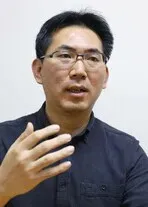
South Korean President Lee Jae Myung arrives with Japanese Prime Minister Shigeru Ishiba’s official residence for their summit in Tokyo on Aug. 23, 2025. (Yonhap)

By Gil Yun-hyung, editorial writer
To avoid misunderstanding, let me start by making a few things clear.
I think the Lee administration’s plan to visit Japan on Aug. 23-24 and hold a summit with US President Donald Trump on Aug. 25 was a brilliant move.
This one-two punch enabled President Lee Jae Myung to simultaneously demolish American conservatives’ stereotype of Lee as being anti-Japanese and anti-American and to reassure Japanese who had viewed Korea’s new government with foreboding.
Despite that, I couldn’t help setting pen to paper for this column.
The joint press statement released after Lee’s summit with the Japanese prime minister — apparently the first such joint statement in 17 years — could well have been labeled “Yoon-lite” (pardon my French).
Disgraced former President Yoon Suk-yeol’s foreign policy toward Japan amounted to aggressively pursuing security cooperation with the goal of checking North Korea and China while sweeping unresolved historical disputes under the rug.
That dubious strategic stance inspired Yoon’s “third-party compensation plan,” representing a unilateral retreat on court-ordered compensation for Korean victims of forced labor during Japan’s colonial occupation, which he announced March 6, 2023. Then Yoon took the first step toward trilateral military cooperation with the US and Japan during a summit at Camp David that August.
The next year, in 2024, the three countries began cementing military cooperation. That led to Freedom Edge, the first ever regular joint military exercise between the three countries, held in late June, and a memorandum of cooperation called Trilateral Security Cooperation Framework that was signed by the three countries’ defense ministers on July 28.
Shin Won-sik, Korea’s defense minister at the time, bracingly declared that these moves were designed to make national security cooperation between the three countries “irreversible.”
The joint statement released by Lee and Ishiba on Aug. 23 basically amounts to setting aside historical disputes and focusing on pressuring North Korea.
In the statement, the two leaders promised to develop their bilateral relationship “based on the foundation of Japan-ROK relations [that] has been established since the normalization of the Japan-ROK relations in 1965.”
That phrase echoes language that appeared in a statement by Japan’s foreign minister on Oct. 30, 2018, the day that Korea’s Supreme Court ordered Japanese companies to compensate Korean victims of forced labor for the illegal and inhuman harm they had suffered. The Japanese foreign minister objected at the time that the Korean court’s ruling had undermined the legal foundation of friendly relations that Japan and Korea had developed since normalizing relations in 1965.
Japan has argued that all (!) claims have been “completely and finally” settled by the claims agreement it reached with Korea in 1965. But Korea’s Supreme Court has found that claims can still be made for harm resulting from “illegal and inhumane acts,” such as compulsory mobilization for forced labor or the sexual slavery of the “comfort woman” system.
References to this “foundation” have become a recurring formula in Japan’s subsequent challenges to the Korean Supreme Court’s ruling.
This phrase made a dramatic comeback on March 11, 2022, when then-president-elect Yoon conducted his first phone call with then-Japanese Prime Minister Fumio Kishida.
Kishida expressed his “expectations” for Yoon’s “leadership” as president while remarking that Japan and South Korea need to develop their relations “based on the foundation of the friendly and cooperative relationship that we have built since the normalization of diplomatic ties in 1965.”
Rather questionable wording was used in the Japanese Foreign Ministry’s official statement on the meeting between the two state leaders on Sept. 21, 2022, which differed from the announcement made by its South Korean counterpart that the two “wholeheartedly agreed” to strengthen bilateral relations “based on this foundation.”
As if to prove that sentiment correct, Yoon completely ignored the Supreme Court’s final judgment by announcing his third-party payment plan for Korean victims of forced labor. Now, as even Lee follows in his predecessor’s footsteps, South Korea has found itself acquiescing to Japan’s stubborn insistence in claiming that the South Korean Supreme Court’s final judgment was illegal and unfair.
National security is also an issue. Lee and Ishiba agreed to ensure “faithful implementation” of UN Security Council resolutions sanctioning the missile and nuclear threats posed by North Korea through close cooperation with each other and the US.
Japan will undoubtedly interpret this promise to mean that South Korea and Japan will join hands to stop US President Donald Trump’s overly casual approach when it comes to North Korea and ensure that North Korea will not be able to pay the US to alleviate the economic sanctions placed on it.
Such a strategy won’t mesh well with the plans Lee has put forward when it comes to North Korea, one of which emphasizes the US’ role as a “peacemaker” in the process of welcoming peace on the Korean Peninsula, another proposing a “three-step” plan to resolve the North Korea nuclear problem.
Improving Korea’s relationship with Japan is, of course, a good thing, and ensuring honest communication between the two countries is vital. However, there is a marked difference between ensuring South Korea makes progress and allowing Japan to continue to defend certain views of history and its decision-making process. Now, more than ever, we need to make sure that South Korea knows how to identify when to be forceful and when to focus on keeping a balance.
If Lee isn’t careful and lets Japan walk all over him, he may find himself turning into a Yoon-lite. I can only hope that Lee stays true to his words: “I promise better results in the future.”
Please direct questions or comments to [english@hani.co.kr]

AloJapan.com